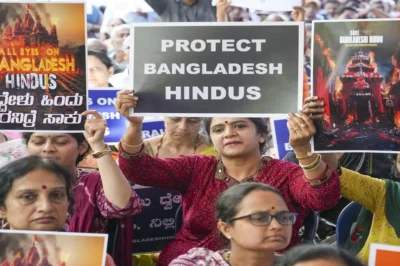Bangladesh has acknowledged 88 instances of attacks on minority communities this year, following India’s expression of concern over the safety of Hindus and other minorities in the country. The confirmation comes a day after Indian Foreign Secretary Vikram Misri conveyed India’s apprehensions to Bangladeshi officials, underscoring the need for stronger measures to protect minority rights.
India’s Concerns Over Minority Safety
India has raised the issue of violence against minorities in Bangladesh on multiple occasions, emphasizing the need for swift action to curb such incidents. In his recent interaction, Foreign Secretary Misri stressed the historical ties between the two nations and highlighted the importance of safeguarding the rights and well-being of minority communities.
Misri stated, “The safety of minorities is central to the values both nations share. It is crucial that efforts are intensified to prevent such attacks and foster communal harmony.”
Details of the Attacks
The reported 88 attacks in Bangladesh include incidents of vandalism, arson, and physical assaults, primarily targeting Hindus, Buddhists, and Christians. Some of the most concerning patterns include:
Desecration of Temples: Several Hindu temples were vandalized, sparking outrage within and outside the country.
Targeting of Individuals: Minority members were reportedly attacked or threatened in isolated incidents, creating a sense of insecurity within their communities.
Disruption of Religious Events: Religious festivals and gatherings faced disruptions, highlighting vulnerabilities in maintaining communal peace.
Bangladesh’s Response
In response to India’s concerns, the Bangladeshi government assured robust action against perpetrators and reaffirmed its commitment to protecting minority communities. Officials emphasized that they are taking all necessary steps to address the incidents and prevent further occurrences.
The Ministry of Home Affairs in Bangladesh issued a statement saying, “We are deeply committed to ensuring communal harmony and taking strict action against those responsible for disturbing peace and security.”
Historical Context of Minority Issues
Bangladesh has long struggled with incidents of violence against minorities, often linked to political and social tensions. While the government has made efforts to address the issue, challenges persist due to:
- Religious Polarization: Periodic surges in communal tensions contribute to targeted violence.
- Political Motivations: Minority communities are sometimes caught in the crossfire of political rivalries.
- Inadequate Enforcement: Delayed investigations and a lack of accountability often embolden offenders.
- India-Bangladesh Relations
- The safety of minorities in Bangladesh has been a recurring theme in diplomatic exchanges between the two countries. Despite these challenges, India and Bangladesh maintain strong bilateral ties, particularly in trade, security, and cultural cooperation.
India’s proactive stance on the issue reflects its broader commitment to upholding human rights and ensuring the welfare of ethnic and religious minorities in neighboring regions.
Reactions to the Incidents
International Condemnation: Human rights organizations and international observers have condemned the violence, urging Bangladesh to strengthen its efforts to protect minorities.
Public Sentiment: The attacks have sparked widespread criticism from minority groups and activists within Bangladesh, calling for greater accountability.
India’s Stand: India’s diplomatic engagement has been appreciated as a step toward ensuring the safety and dignity of minorities.
Steps Forward
To address the ongoing issue, several measures are being proposed:
Stronger Policing: Enhanced security in vulnerable areas to deter future attacks.
Community Engagement: Promoting interfaith dialogues and communal harmony initiatives.
Expedited Justice: Ensuring swift investigations and strict penalties for perpetrators.
Conclusion
The confirmation of 88 attacks on minorities in Bangladesh highlights the urgent need for sustained efforts to protect vulnerable communities. As India continues to voice its concerns, the responsibility lies with Bangladesh to uphold its commitments and foster an environment of tolerance and inclusivity. Strengthening safeguards for minorities is not only crucial for Bangladesh’s social fabric but also pivotal for maintaining robust ties with its neighbors.








Leave a Reply